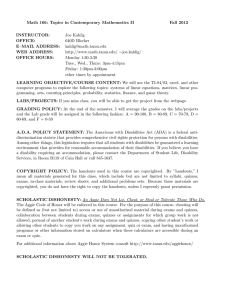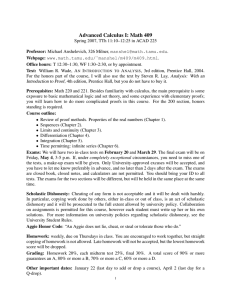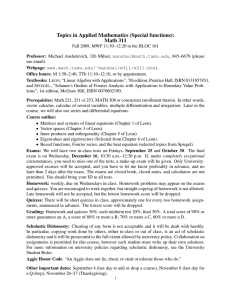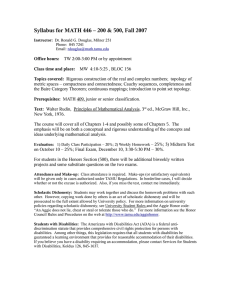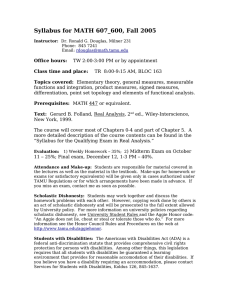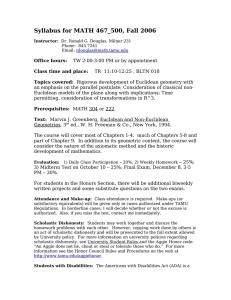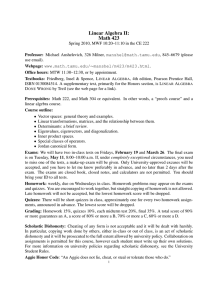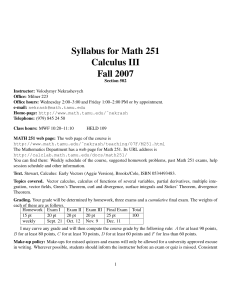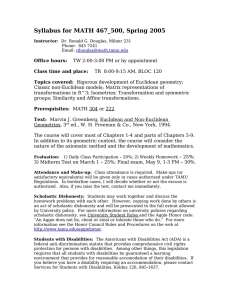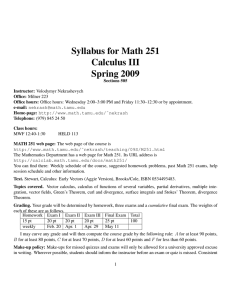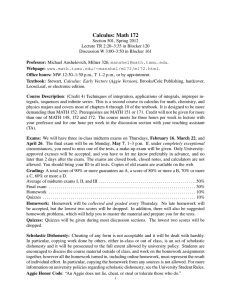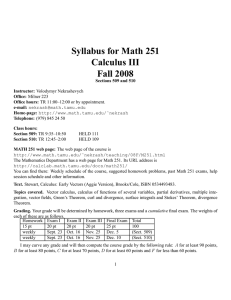Principles of Analysis I: Math 446
advertisement
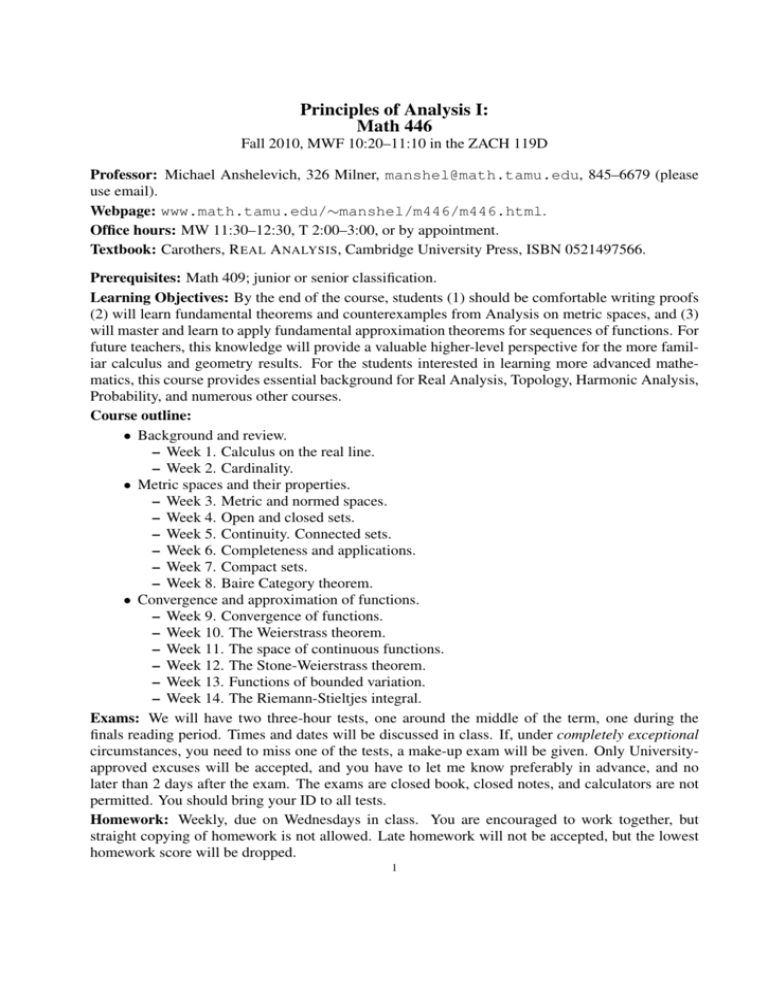
Principles of Analysis I: Math 446 Fall 2010, MWF 10:20–11:10 in the ZACH 119D Professor: Michael Anshelevich, 326 Milner, manshel@math.tamu.edu, 845–6679 (please use email). Webpage: www.math.tamu.edu/∼manshel/m446/m446.html. Office hours: MW 11:30–12:30, T 2:00–3:00, or by appointment. Textbook: Carothers, R EAL A NALYSIS, Cambridge University Press, ISBN 0521497566. Prerequisites: Math 409; junior or senior classification. Learning Objectives: By the end of the course, students (1) should be comfortable writing proofs (2) will learn fundamental theorems and counterexamples from Analysis on metric spaces, and (3) will master and learn to apply fundamental approximation theorems for sequences of functions. For future teachers, this knowledge will provide a valuable higher-level perspective for the more familiar calculus and geometry results. For the students interested in learning more advanced mathematics, this course provides essential background for Real Analysis, Topology, Harmonic Analysis, Probability, and numerous other courses. Course outline: • Background and review. – Week 1. Calculus on the real line. – Week 2. Cardinality. • Metric spaces and their properties. – Week 3. Metric and normed spaces. – Week 4. Open and closed sets. – Week 5. Continuity. Connected sets. – Week 6. Completeness and applications. – Week 7. Compact sets. – Week 8. Baire Category theorem. • Convergence and approximation of functions. – Week 9. Convergence of functions. – Week 10. The Weierstrass theorem. – Week 11. The space of continuous functions. – Week 12. The Stone-Weierstrass theorem. – Week 13. Functions of bounded variation. – Week 14. The Riemann-Stieltjes integral. Exams: We will have two three-hour tests, one around the middle of the term, one during the finals reading period. Times and dates will be discussed in class. If, under completely exceptional circumstances, you need to miss one of the tests, a make-up exam will be given. Only Universityapproved excuses will be accepted, and you have to let me know preferably in advance, and no later than 2 days after the exam. The exams are closed book, closed notes, and calculators are not permitted. You should bring your ID to all tests. Homework: Weekly, due on Wednesdays in class. You are encouraged to work together, but straight copying of homework is not allowed. Late homework will not be accepted, but the lowest homework score will be dropped. 1 Quizzes: Part of the weekly homework assignment will be designated a quiz. You are allowed to use any written sources for the quizzes, but not to discuss them with you fellow students or anybody else. The lowest score will be dropped. Grading: Homework 20%, quizzes 20%, each test 30%. A total score of 90% or more guarantees an A, a score of 80% or more a B, 70% or more a C, 60% or more a D. Scholastic Dishonesty: Cheating of any form is not acceptable and it will be dealt with harshly. In particular, copying work done by others, either in-class or out of class, is an act of scholastic dishonesty and it will be prosecuted to the full extent allowed by university policy. Collaboration on assignments is permitted for this course, however each student must write up their own solutions. For more information on university policies regarding scholastic dishonesty, see the University Student Rules. Aggie Honor Code: “An Aggie does not lie, cheat, or steal or tolerate those who do.” Difference between sections: The 200 (honors) and 500 (regular) sections will have different tests and homework assignments. Some topics from the textbooks will be discussed in class primarily for the benefit of the honors students, and will be required material for them but optional for the rest of the class. Other important dates: September 3 (last day to add or drop a course), November 25-26 (Thanksgiving), December 6 (last day of classes). Students with disabilities: Come talk to me no later than the first week of classes. “The Americans with Disabilities Act (ADA) is a federal anti-discrimination statute that provides comprehensive civil rights protection for persons with disabilities. Among other things, this legislation requires that all students with disabilities be guaranteed a learning environment that provides for reasonable accommodation of their disabilities. If you believe that you have a disability requiring an accommodation, please contact the Department of Student Life, Services for Students with Disabilities, in Room 126 of the Koldus Building or call 845–1637.” Attendance: According to the University Student Rules, absence for three or more class days requires a University-approved excuse and documentation. Keys to success: Attend class (of course :) Solve all the homework problems, well before the exams. Spend more than seven hours per week working on the problems. Form study groups to discuss the course material and homework problems. Read ahead in the text. All printed handouts and web-materials are protected by US Copyright Laws. No multiple copies can be made without written permission by the instructor.
